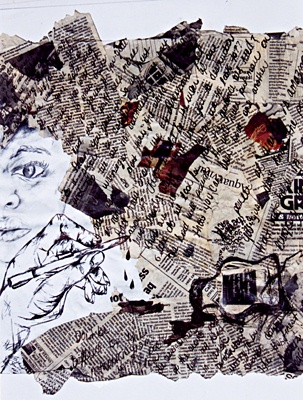All Nonfiction
- Bullying
- Books
- Academic
- Author Interviews
- Celebrity interviews
- College Articles
- College Essays
- Educator of the Year
- Heroes
- Interviews
- Memoir
- Personal Experience
- Sports
- Travel & Culture
All Opinions
- Bullying
- Current Events / Politics
- Discrimination
- Drugs / Alcohol / Smoking
- Entertainment / Celebrities
- Environment
- Love / Relationships
- Movies / Music / TV
- Pop Culture / Trends
- School / College
- Social Issues / Civics
- Spirituality / Religion
- Sports / Hobbies
All Hot Topics
- Bullying
- Community Service
- Environment
- Health
- Letters to the Editor
- Pride & Prejudice
- What Matters
- Back
Summer Guide
- Program Links
- Program Reviews
- Back
College Guide
- College Links
- College Reviews
- College Essays
- College Articles
- Back
Slam Poetry
November 1984 -- Marc Smith holds the world’s first poetry slam in Chicago’s Get Me High Lounge. By July of 1986, poetry slams were being held regularly at the Green Mill Jazz Club. Numerous local slams were held in cities throughout the country; however, it was not until 1990 that the first National Poetry Slam was held. Today, there are countless poetry slams -- events both large and small -- being held across the world, as well as countless organizations that continuously provide financial support for these events.
Slam poetry is very different from performance poetry. In performance poetry, one is allowed to use props or costumes to aid the presentation of their poem; however, this is not allowed in slam poetry. In slam poetry, one must rely solely on their vocal intonations, hand gestures, and other forms of body language in order to enhance their poem. While some people utilize a rhythm similar to what one may use on a daily basis, other poets’ styles of presentation draw heavily from hip-hop and dub poetry, a form of performance poetry originating from the West Indies.
A large number of poetry slams have no theme and allow poets to choose whatever topic they please. Popular topics include the various aspects of social justice as well as the poets’ personal lives. Many poets consistently write about their lives and the struggles they have faced; for example, Patrick Roche. Formerly a member of the slam poetry team at Princeton University (known as Ellipses) until his graduation in 2014, his poems draw from the struggles he faced growing up with an alcoholic father and a mother who, though she tried her best, was still incompetent.
On the other hand, poets like Desireé Dallagiacomo regularly address topics relating to social justice: in her case, to feminism. Using language, she paints a picture of the various injustices that women often face -- not only the wage gap, but the contrasting societal perceptions between men and women. She uses poetry as an outlet for her ideals and uses it to speak up and stand out against oppression and misogyny. Poets like Rudy Francisco, whose poems address African-American rights, write in a similar manner with a similar goal.
Poetry slams are often competitive; however, many open mic slams exist as well. In competitive slams, one may choose to perform work alone or with another person. All forms of slams are open to all age groups and ethnicities, though some organizations are solely for women. Poetry slams serve as an emotional outlet for many poets, and thus most of the work presented is extremely intense and honest. Slam poetry attracts diverse audiences and encourages them to speak about non-traditional topics of conversation, making it an effective form of communication for poets, and, for the audience, a good opportunity to be introduced to various ideals and ideas.

Similar Articles
JOIN THE DISCUSSION
This article has 0 comments.
